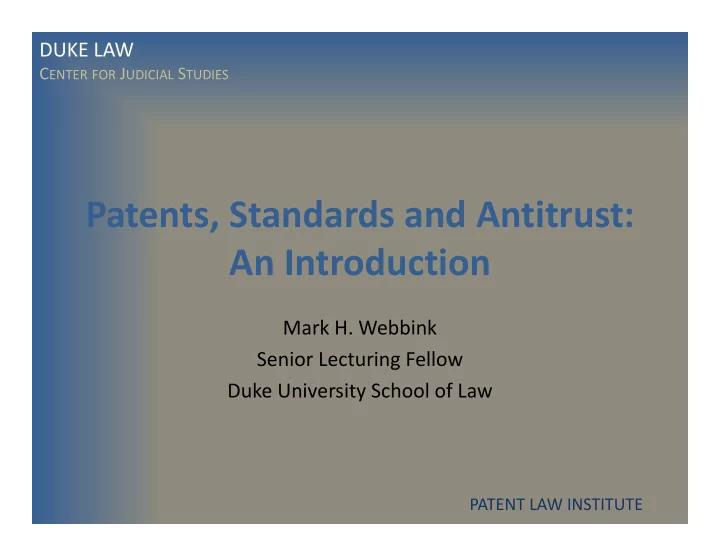

DUKE LAW C ENTER FOR J UDICIAL S TUDIES Patents, Standards and Antitrust: An Introduction Mark H. Webbink Senior Lecturing Fellow Duke University School of Law PATENT LAW INSTITUTE
DUKE LAW C ENTER FOR J UDICIAL S TUDIES • Nature of standards, standards setting organizations, and their intellectual property policies • Smartphone wars and some of the historical disputes • Antitrust concerns in standards ‐ setting PATENT LAW INSTITUTE
DUKE LAW C ENTER FOR J UDICIAL S TUDIES Standard Approved Model Common Practice Coordination Problem PATENT LAW INSTITUTE
DUKE LAW C ENTER FOR J UDICIAL S TUDIES Set By Consensus Custom Usage Agreement Government Regulation Formal Approval Process PATENT LAW INSTITUTE
DUKE LAW C ENTER FOR J UDICIAL S TUDIES ISO Definition: A document established by consensus and approved by a recognized body that provides for common and repeated use, rules, guidelines or characteristics for activities or their results, aimed at the achievement of the optimum degree of order in a given context. PATENT LAW INSTITUTE
DUKE LAW C ENTER FOR J UDICIAL S TUDIES A Better Definition? A common practice, established through government regulation, industry cooperation, market force, consumer use, or formal standard ‐ setting, providing a mechanism for broad adoption and providing a common practice to achieve interoperability, public safety, or other beneficial use. PATENT LAW INSTITUTE
DUKE LAW C ENTER FOR J UDICIAL S TUDIES SDO – Standard Developing Organization SSO – Standard Setting Organization PATENT LAW INSTITUTE
DUKE LAW C ENTER FOR J UDICIAL S TUDIES World Standards Cooperation Alliance PATENT LAW INSTITUTE
World Standards Cooperation alliance DUKE LAW C ENTER FOR J UDICIAL S TUDIES PATENT LAW INSTITUTE
DUKE LAW C ENTER FOR J UDICIAL S TUDIES Standard Development Process: • Standard Proposed by Sponsor • Proposal Approved for Development • Working Group Formed • Rules and Processes Established • Development Task Undertaken (Disclosures) • Interim Drafts Developed (Disclosures) • Final Draft Developed (Disclosures) • Standard Adopted PATENT LAW INSTITUTE
DUKE LAW C ENTER FOR J UDICIAL S TUDIES SDO Participation Concerns: • What is it going to cost me? • Clear path to implementation • Treated fairly, level playing field PATENT LAW INSTITUTE
DUKE LAW C ENTER FOR J UDICIAL S TUDIES Patent Stacking Patent Hold ‐ up PATENT LAW INSTITUTE
DUKE LAW C ENTER FOR J UDICIAL S TUDIES 4 EP X 0.25% royalty rate = 1.0% royalty 46 EP X 0.25% royalty rate = 11.5% royalty PATENT LAW INSTITUTE
DUKE LAW C ENTER FOR J UDICIAL S TUDIES Disclose F/RAND Identify PATENT LAW INSTITUTE
DUKE LAW C ENTER FOR J UDICIAL S TUDIES Identify Disclose Essential F/RAND PATENT LAW INSTITUTE
DUKE LAW C ENTER FOR J UDICIAL S TUDIES In re Dell Computer Corporation FTC Docket C ‐ 3658, May 20, 1996 PATENT LAW INSTITUTE
DUKE LAW C ENTER FOR J UDICIAL S TUDIES OASIS definition of essential claims: [T]hose claims in any patent or patent application in any jurisdiction in the world that would necessarily be infringed by an implementation of those portions of a particular OASIS Standards Final Deliverable created within the scope of the Technical Committee (TC) charter in effect at the time such deliverable was developed. PATENT LAW INSTITUTE
DUKE LAW C ENTER FOR J UDICIAL S TUDIES OASIS IPR Modes • RAND • RF on RAND Terms • RF on Limited Terms • Non ‐ Assertion PATENT LAW INSTITUTE
DUKE LAW C ENTER FOR J UDICIAL S TUDIES ETSI Licensing Terms Written irrevocable assurance of willingness to grant irrevocable licenses on FRAND terms. PATENT LAW INSTITUTE
DUKE LAW C ENTER FOR J UDICIAL S TUDIES IEEE Letter of Assurance Disclaimer of enforcement or FRAND/FRAND ‐ Zero license available PATENT LAW INSTITUTE
DUKE LAW C ENTER FOR J UDICIAL S TUDIES PATENT LAW INSTITUTE
DUKE LAW C ENTER FOR J UDICIAL S TUDIES Contreras/FRAND ‐ Feb. 23, 2013 PATENT LAW INSTITUTE
DUKE LAW C ENTER FOR J UDICIAL S TUDIES F/RAND TERMS Rockwell v. Motorola (1997) Broadcom v. Qualcomm (2007) Ericsson v. Samsung (2007) Zoran v. DTS (2009) Nokia v. Apple (2011) Realtek Semiconductor v. LSI (2012) Apple v. Motorola (2012) Samsung v. Ericsson (2012) PATENT LAW INSTITUTE
DUKE LAW C ENTER FOR J UDICIAL S TUDIES IPR Policy Compliance Townsend v. Rockwell (1997) Nokia v. Qualcomm (2006) Rembrandt v. Harris (2007) Research in Motion v. Motorola (2008) Wi ‐ LAN v. Research in Motion (2008) In re Negotiated Data Solutions (2008) HTC Corp. v. IPCom (2010) Multimedia Patent Trust v. Apple (2012) Huawei v. InterDigital (2011) Apple v. Samsung (2013) Microsoft v. Motorola (pending) PATENT LAW INSTITUTE
DUKE LAW C ENTER FOR J UDICIAL S TUDIES Standards Enforcement In re Google (2013) PATENT LAW INSTITUTE
DUKE LAW C ENTER FOR J UDICIAL S TUDIES DOJ SDO Guidelines: • Ex ante disclosure • Licensing commitment runs with patent • No cross ‐ licensing of non ‐ essential patents • Limit injunctive relief • Guidelines on what is F/RAND • Increased certainty of “essential” PATENT LAW INSTITUTE
DUKE LAW C ENTER FOR J UDICIAL S TUDIES What is F/RAND? What are essential claims? What enforcement measures? PATENT LAW INSTITUTE
DUKE LAW C ENTER FOR J UDICIAL S TUDIES SDO’s must avoid anticompetitive behavior PATENT LAW INSTITUTE
DUKE LAW C ENTER FOR J UDICIAL S TUDIES Antitrust Examples: • Price fixing • Output restrictions • Horizontal division of markets • Restrictions on competition PATENT LAW INSTITUTE
DUKE LAW C ENTER FOR J UDICIAL S TUDIES “ All truly essential patents for a successful standard inherently have market power .” ‐ Fiona M. Scott ‐ Martin Dep. Asst. AG Antitrust Division U.S. DOJ PATENT LAW INSTITUTE
DUKE LAW C ENTER FOR J UDICIAL S TUDIES IEEE Topics to Be Avoided: • Pricing of compliant products • Profits or profit margins • Market share or territories • Allocation of customers, markets, … • Exclusion through standards • Tying • Bidding • Restricting independence of action PATENT LAW INSTITUTE
Recommend
More recommend